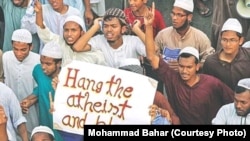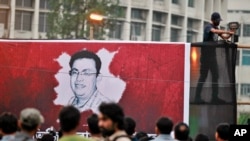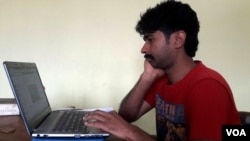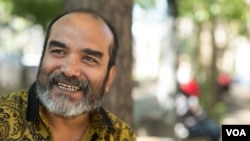Two years after Avijit Roy was hacked to death by suspected Islamist militants in Dhaka, relatives and friends of the Bangladeshi-American atheist blogger and writer say they are not satisfied with the pace of the police investigation.
As Bangladesh probes of Roy’s murder-- and those of about a dozen other secular bloggers, writers and a publisher, killed between 2013 and 2015—are making no public progress, fears of threats from the Islamists has halted the publication of books critical of religions and religious fundamentalism in Bangladesh.
"[In the case of Roy’s murder] although two years have been passed by, the [government] agencies have not filed the charge-sheet to the court as yet. They postponed the date[s] of submission of the charge-sheet at least sixteen times. Eight people were arrested, but no charge-sheet was filed against any of them. Now they are saying that they have identified five men as the actual killers, but they are yet to be arrested," said Imran H. Sarker, who leads the Blogger and Online Activist Network in Bangladesh.
"We have noticed that the government is shielding the killers and is not keen to arrest them," he added.
Bangladesh police have said a local hardline Islamist militant group, the Ansarullah Bangla Team (ABT), was behind all the killings. However, none of the murders, including that of Roy, has been solved as yet.
Baseless allegations
But Bangladesh’s Inspector General of the national police (IGP), AKM Shahidul Hoque, said the charge that police are doing a poor job investigating the cases of the blogger killings, is baseless. The police will file a charge-sheet in the case of Roy "very soon," he said.
Hasanul Haq Inu, information minister of Bangladesh said all investigations into the blogger killings are going on well.
"The performance of our police is commendable in all investigations in the killings of the bloggers. We are close to resolve all cases. In the case of Avijit we have already located the killers," Inu told VOA.
"The so-called Islamist groups are not in a position to launch any violent attack at all. We have neutralized all of them."
Publishing chill
Months after Roy was murdered in February 2015, Faisal Arefin Dipan, one of his publishers, was hacked to death in Dhaka.
"[The] killings of the author and his publisher triggered an atmosphere of sheer fear in the society. And, that fear has taken its toll on the publishing industry in the country," said Robin Ahsan, head Shrabon Prokashoni, a Dhaka-based publishing house, which is taking part in the ongoing national book fair in Dhaka.
A little over a decade ago, some Bangladeshi writers, who presented their arguments against Islamic and other religious beliefs online, became known as "atheist bloggers."
Blogger Mohiuddin Sharif, who faced death threats and fled Bangladesh in 2015, said new critical writings on religion, society and the state have disappeared in the past couple of years largely because the government has taken a "soft stance" against the Islamists.
"When the Islamists began targeting the bloggers, the government did not provide them the security. Instead of protecting the bloggers, it blamed them that they were indulging in ‘provocative’ writing. Many were even advised to leave the country," said Sharif, who has taken refuge in a South Asian country with his family.
In the past, many books written by the secular writers used to be published during the annual Dhaka book fair, the blogger noted.
"But this year, not a single book on freethinking has been published in the fair. No stall in the fair is displaying even any old book authored by Avijit Roy this year," he said.
Communication law
Along with the threats from the Islamists, Section 57 of Bangladesh's Information and Communications Technology (ICT) Act is a contributing factor to the disappearance of writing critical of religion, government and society, say the bloggers, writers and publishers.
Under this controversial piece of legislation, one can face seven to 14 years in jail for "hurting religious sentiment" and "publishing fake, obscene or defaming information in electronic form" or information that "prejudices the image of the State or person."
Mahbub Leelen, co-founder of Shuddhashar Publishing House, which published many books authored by Avijit Roy, said that using the "draconian" act the government has clamped down heavily on writers and publishers.
"The ICT Act and the related statements from the government directly support the views the fundamentalists demand in the issue. As individuals, the writers or publishers have no ability to fight this united force of the fundamentalists and the government," said Leelen, who fled to the U.S. in 2015, weeks after Ahmedur Rashid Chowdhury Tutul, his co-publisher of Shuddhashar, was violently attacked by suspected Islamists in Dhaka, told VOA.
Shuddhashar closed down in Dhaka soon after the attack and Leelen and Tutul, who lives in Norway now, are working on a project to revive the publishing house abroad, with the publication of some e-books.







